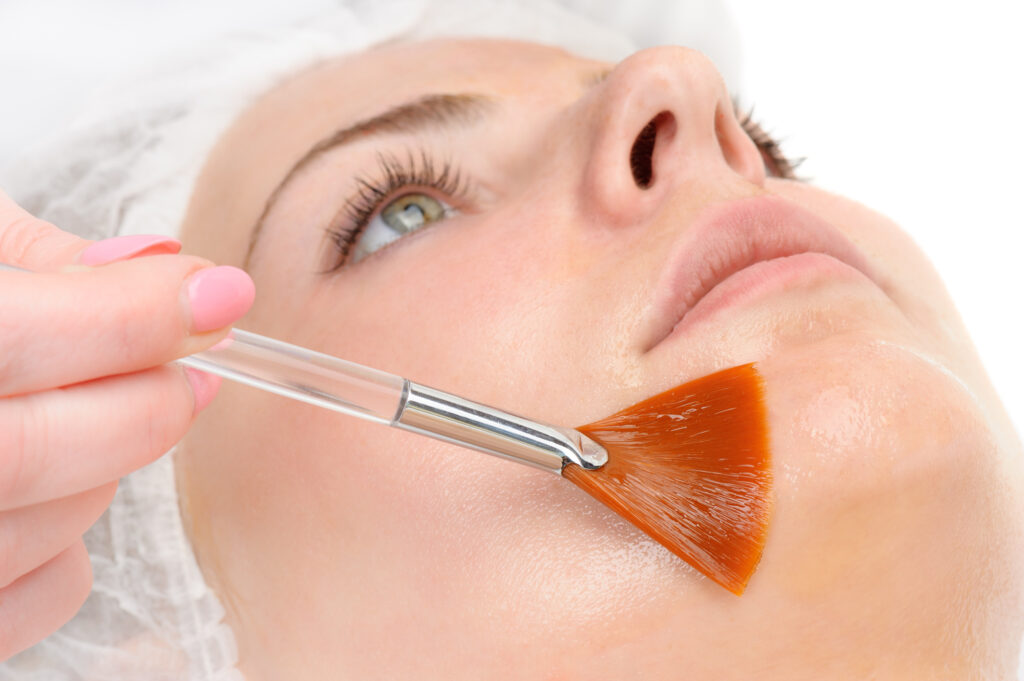July 31, 2019
What You Need to Know About Chemical Skin Peels

If you’ve ever dreamed about peeling the freckles, pimples or wrinkles right off of your face, the good news is you can—in a way. Through a chemical skin peel, you can refresh your skin and eliminate some of the blemishes that make you cringe.
Not sure what a chemical skin peel is or if it’s right for you? Don’t worry, we’ve got you covered. Read through this in-depth guide to find out what you need to know about getting a chemical skin peel.
What Is a Chemical Skin Peel?
A chemical skin peel is exactly what it sounds like—a chemical solution that’s applied to the skin to make the top layer or layers peel off. The result is soft, smooth, and radiant skin. In addition to your face, chemical peels can be used for the neck, chest, and hands.
The biggest benefit of chemical peels is that they can either eliminate or greatly reduce the appearance of a variety of skin blemishes including:
- Acne
- Age spots, freckles and sun damage
- Fine lines and wrinkles, particularly around the eyes and mouth
- Hyperpigmentation and discoloration
- Minor scars
Types of Chemical Skin Peels
Different chemicals of varying strengths are used in skin peels. The type used will depend on the skin issue you want to clear up. The three main types of peels are:
Mild
You may hear this type of peel referred to as an afternoon peel or a lunchtime peel because the recovery time is minimal. Typically, citric acid or lactic acid are used in mild peels, which gently exfoliate and remove the topmost layer of skin. Mild skin peels are best for minor lines or wrinkles, light skin discoloration, or rough-textured skin.
Medium
As you would expect, a medium chemical peel penetrates a little more deeply than a mild peel. Glycolic acid and trichloroacetic acid are usually used for medium peels, which can treat fine lines, wrinkles, freckles, and even precancerous growths. While mild peels will cause a tingling sensation during application, medium chemical peels can cause blistering and redness. This means that the downtime is a little longer—seven to 14 days, as opposed to one to seven days for a mild peel.
Deep
Exercise caution with deep skin peels, which consist of strongly concentrated trichloroacetic acid or phenols. Chemical peels made of phenols can cause heart or kidney issues, so consult with a dermatologist, and even your primary care physician, before getting this type of peel. Deep peels can treat etched lines and wrinkles, sun damage, and scars. Because of the intensity of the chemicals, deep peels cannot be used on the neck, chest and hands since those are more sensitive skin areas. Deep peels will require up to three months of recovery as the skin will blister, crust and peel. Pain medication may be necessary during or after the peel.
What to Know Before You Go
Ready to refresh your skin with a chemical peel? Here are some things to keep in mind before you head to your esthetician or dermatologist:
- Chemical peels are done in either an outpatient center or a dermatologist’s office. Before the peel, the dermatologist will clean your skin. The solution will be applied and left on for five to 10 minutes. After the peel is removed, cold compresses are applied. After a deep chemical peel, bandages may be applied to the area to protect your skin.
- Since chemical peels have similar effects on your skin as a sunburn, you’ll need to avoid the sun afterward. After a mild peel, apply sunscreen on the area and you’ll be good to go. After a medium peel, try to avoid the outdoors, but wear sunscreen and a wide-brimmed hat when you do go outside. After a deep peel, avoid the sun until your skin is completely healed.
- If you have a darker skin tone, you are more likely to develop an uneven skin tone after a peel. Women who are prone to brown-colored skin discoloration or who are on birth control and become pregnant may experience discoloration as well. This side effect may be temporary or could be permanent.
At Salon Success Academy, our Esthetician Program will provide you with instruction on how to give manual, electrical and chemical facials, including chemical skin peels. Interested in learning more? Call 1-877-987-4247 today to kickstart a new career in the beauty industry.
